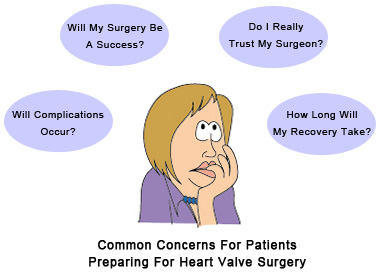“How To Manage The Fear & Anxiety Before Heart Valve Surgery?” Asks Sophia
By Adam Pick on May 14, 2011
Sophia sent me a very appropriate question about two emotions experienced by most patients prior to heart valve surgery. She writes, “Adam – I’m 62 and diagnosed with mitral regurgitation. I need surgery and I’m scared out of my mind. Is there anything the surgeons can share that could ease my fear and anxiety?”

Luckily, I was able to ask this exact question to Dr. Marc Gillinov, MD, a leading surgeon from The Cleveland Clinic. So you know, Dr. Gillinov has performed over 2,500 heart valve procedures during his career.
I’m hopeful this video interview helped Sophia (and perhaps you) understand the realities of heart valve surgery. As Dr. Gillinov suggests, the odds are very favorable that you will have a successful procedure. However, please take the time to do your homework — get a second opinion, research your surgical options, evaluate your surgeon — prior to entering the hospital.
Thanks to Sophia for her question. And, a special thanks to Doctor Marc Gillinov for sharing his clinical experience and advice with all of us. For those of you who are hearing impaired, I have provided a written transcript of this video interview with Dr. Gillinov below.
Adam: Hi, everybody. It’s Adam and we are here at the Mitral Conclave very fortunate to be standing next to Dr. Marc Gillinov from the Cleveland Clinic. We’re answering your questions up at HeartValveBlog.com. This question, Dr. Gillinov, comes from Sophia and she writes, “Adam, I’m 62 and diagnosed with severe regurgitation. I need surgery and I’m scared out of my mind. Is there anything the surgeons can share to help ease my anxiety and fear?”
Dr. Gillinov: Absolutely. It’s normal to have some fear and some apprehension. Somebody tells you, “You need heart surgery,” and most people never expect to hear those words. I would recommend a few things. I’ve talked to many, many people, thousands of people, with this sort of concern. First, gather information but don’t dive too deeply into the internet. Go to a few reputable sites, like yours, and get information but don’t over think it because the more information you get, the more contradictions you’ll find, inaccurate causing more anxiety. So go to the internet and get some information. Talk to someone you know. I mean, you must know someone. You will know someone who’s had heart surgery, who’s had a heart issue, because they will reassure you and then when you go to meet with your surgeon, sit down with your surgeon and do listen to what your surgeon says, what he or she tells you about what operation should you have, how should we do it, but ask questions that go beyond just the technical aspects of the surgery. Ask the questions that have answers that are going to allay your concerns. For example, people almost never ask, “Is this going to hurt?” Or “If it is going to hurt, how can you make it so it doesn’t hurt very much?” People rarely ask, “How long ‘til I feel normal?” There are no concrete answers to these questions. Depending upon how your operation’s done, your surgeon’s going to be able to say, “It might be two weeks, three weeks, four weeks, five weeks.” Your surgeon might be able to say, “We’ve got a great protocol in place for managing discomfort so that we will keep it under control.” And probably most important, make sure that your doctor or your surgeon are people who are willing to talk to you because you do want an excellent communicator. You want everything fixed on the inside but just like dropping your car off to get the brakes fixed where you don’t really care if you talk too much to the mechanic, in this case through the whole process the patient is talking to the doctor and having all your concerns addressed. So, get the best plumber you can and make sure you’re getting a good person as well.
Adam: And one of the questions that a lot of people, one of the big fears, is that of, obviously, death and mortality. And I knew what I found comfort in was the actual statistics of success, not of failure but of success. Can you share a little bit about your statistical outcomes with patients who have come to you like Sophia who have issues with severe regurgitation and need surgery.
Dr. Gillinov: Well, Adam, you just made a really excellent point. I now always phrase the statistics in terms of success. I used to tell people – Let’s say you’re having an isolated mitral valve repair operation and our operating risk of the person dying is around one in a thousand and when I said to somebody, “Your risk of not getting through is one in a thousand,” a lot of the time they heard that wrong. They thought their chance of surviving was one in a thousand and, of course, you don’t want to do anything where the chance of surviving is one in a thousand so to set the record straight, the chance of surviving an isolated mitral valve operation is 999 out of a thousand so 999 out of a thousand, we hope, will sail through getting their mitral valves fixed. 99% of them won’t have a stroke or a heart attack so we’re talking about people who in generality, the chance that you get through this and come out the other end in great shape.
Adam: Great. Well, as always, Dr. Gillinov, thanks for your help and all of your incredible support. We really appreciate it. Again, this is Dr. Marc Gillinov from the Cleveland Clinic and you can learn more him at the Heart Valve Surgeon Finder. Thanks much.
Keep on tickin!
Adam
|
Paul Klaassen says on May 15th, 2011 at 2:13 pm |
|
Adam, My surgeon was similarly reassuring in conversations prior to my surgery, and added one further point. The young patient (at 62 Sophia is still young to a heart surgeon) and the patient without co-morbidities have even better odds than the norm. Around the world each year 250,000 valve replacements take place, 75,000 in America alone. This surgery is becoming quite commonplace and all aspects of it from diagnosis through anesthetics, the actual prosthetics and just as importantly, the rehab, have improved dramatically in the last couple of decades. It’s a leap of faith but the rewards so vastly outweigh the risks that it’s best just to look right where you want to go and get on the road to feeling better. |
 |
|
Ricky (a female) says on May 15th, 2011 at 3:15 pm |
|
Dr Gillinov,reminds me of my Dr……..When I was diagnosed,I WAS VERY FRIGHTENED……..just having my Dr. calling my Brother(who is also a Dr.)in front of me,telling him the situation,made me MUCH CALMER.My Dr. even kept me in the hospital a couple of days longer,because he knew my Brother was coming from out of town,had to leave right after I got home.Not only was he a skilled surgeon,he was a true human,with compassion,to ease my fears.PS……before surgery,I marked my chest with an invisable line to show myself what I would look like afterwards……that way,it was not SUCH!!! a big shock to see myself,after surgery…..KEEP TICKIN EVERYONE!!!!! |
 |
|
Linda says on May 15th, 2011 at 3:36 pm |
|
Thanks,Adam..Your book has been a great investment,even though my son will have his 3rd aortic valve replacement on Tuesday,I think the information ,both written and recieved from his 2nd opinion he got from Cleveland Clinic helped him to make a different decision than his surgeon suggested,but one he is satisfied with.he has chosen the bovine valve and to have only his aortic valve replaced, not his pulminary which is ok for now.Cleveland reassured that if they have to “go again” due to infection again or??new procedures are in the near future. I would add,know your insurance from now on.To only be able to go to one hospital,one Doctor causes more worry. IF I can squeeze in one question before Tuesday..Tony has been sick this time..unable to breathe,holding water,trips to the ERhaving to stand to breathe at times.It hasnt been this way before.They say his heart hasnt been “damaged” do these symptoms as well as being pacemaker dependent cause his surgery to be more high risk? Thanks again especially for your follow up..and Our faith in God as the great physician draws us closer together and closer to Him.ALSO keep a board and pointer with things like “Im having pain.Im thirsty,I have an itch, the tube is on my gag reflex..etc” it helps when on the vent.God Bless and Thanks |
 |
|
Fran says on May 15th, 2011 at 4:07 pm |
|
Now you know why I had Dr. Gillinov do my two valve surgery last year. He exudes confidence and has a calm, reassuring manner. The Cleveland Clinic also made available a download for relaxation/visualization which I listened to right into the operating room. It really helped. |
 |
|
W.D.Brown says on May 15th, 2011 at 5:42 pm |
|
Hi Sophia, I was a 67 year old male and had only 3/4 of each lung due to the right and left lung being operatied on when I went in for a AORTIC Mecahnical Valve, I was scared but having talked to my Cardioligist and Surgeon and God I was calmed down and came through like it was planned. So keep the FAITH and let us know the out come. My Surgeon Dr. Duke Cameron at John Hopkins Hospital in Baltimore Marland has God Guided hands.W.D.Brown worker@att.net |
 |
|
Lloyd says on May 15th, 2011 at 7:36 pm |
|
I too was fearful of my valve replacement surgery two years ago. I contacted my local hospital and I was referred to a wonderful lady who does pre-surgery counseling. In one session she provided me with information on the operation and what to expect during my hospital stay and what to expect when I went home. The most important thing she told me is where will I be two hours, two days, two weeks and two months after the surgery. Think positive and everything will work out, it die for me. Their is pre-surgery counseling out there, you just have to search it out. Lloyd |
 |
|
MJ Samer says on May 15th, 2011 at 7:50 pm |
|
I would agree that reading Adam’s book carefully helped relax me and ease some anxiety before my heart valve surgery (I was also 62, but this was my 3rd open heart surgery…) Trust your surgeon, trust God, and have a person or two who will support you through it all (that was my husband, first and foremost, and family and friends, too) and you’ll be OK. |
 |
|
Lynn Walka says on May 15th, 2011 at 9:36 pm |
|
Hi Sophia, At age 59, I was diagnosed with severe stenosis of my aortic valve. Last July it was replaced and I am playing singles tennis again along with Zumba and spin. Know that you will be well again and enjoying life. Three days after surgery you will be walking and maybe doing stairs a few days later. Adam’s book helped more than anything else. Make sure you go for post heart rehab which you will enjoy being with those just like us! You will be fine. Lynn |
 |
|
Ricky (a female) says on May 15th, 2011 at 10:09 pm |
|
In reading many of the replies on this question,I notice on thing in particular…we have a belief in G’d………Trust in your Dr. and G’d,for guidance.When it came time to sign papers,I was nervous,with all of the,”what ifs”……my Brother said,do you have trust in the Drs.??? Just sign the papers,and BELIEVE everything will be okay.ATTITUDE IS EVERYTHING….Wish that Adam’s book had been around 8+years ago. |
 |
|
Jack Seavy says on May 18th, 2011 at 8:55 am |
|
I Had my aortic valve surgery done two years ago and am doing fine. I too was filled with dread and anxiety and depression before and after my surgery. All the questions and reading helped somewhat, but I was still filled with fears. I had my surgery, everything went as expected and I still felt like shit. I excercised and did everything I was supposed to and six weeks later was still depressed and anxious. Physically I was fine but mentally I was no better than the month before surgery. I then sought help which was two months too late. I should have had preoperative counseling and postoperative counseling. Yoga, Guided imagery, someone to talk too and medications helped me a great deal. I would have benefitted greatly by doing it before surgery. There are things you can do that will help you not feel so awful and I hope you seek them out. Talking to your surgeon is important but not nearly enough. Best of luck. Jack Seavy MD |
 |
|
steven husted says on July 27th, 2014 at 12:52 am |
|
hi i am feeling a little better about my operation for avs & by pass after reading all this information i think the more i read the more i feel i should do this asap because my symtoms are just getting worse each day i put it off thanks for all the posts steven a husted |
 |
|
steven husted says on July 31st, 2014 at 7:55 am |
|
wow what a blog it is so helpful to calm my fears thank you adam and all of the patients on here steve |
 |












